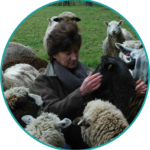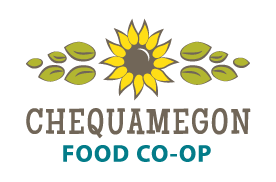
Spring Election 2024 - Three Candidate Bios - 2 vacancies
Colleen Beagan, Cynthia Dalzell and Silas Westbrooks - Vote for 2
1. Collen Beagan

Describe your experience with this cooperative and cooperatives generally.
When I moved to Bayfield in September 2020, one of the first things I did was become a member of the coop. I was a member of Mississippi Market coop in the Twin Cities prior to moving to Bayfield. The coop always has what I need, and I especially like the focus on providing members with local food and products. All the employees are helpful and knowledgeable about the products sold. As the Dean of Curriculum and Instruction for Bayfield Schools, I appreciate the use of Ojibwe to educate members about the culture of Red Cliff and Bad River.
Summarize your professional experience and relevant skills. What unique skills, personal qualities, or perspectives will you bring to the board?
I have been in K-12 education for over 20 years. In July 2022, I became the Dean of Curriculum and Instruction for Bayfield Schools. One of the main initiatives we are working on is career readiness. Part of this goal is to create more community and business connections for students, and the coop is one of the connections we hope to make. I want our students to be career ready when they graduate, and to stay in the area. There are so many amazing opportunities, they just need to know what they are and have a chance to experience them through job shadowing, work-based learning, and internships. As a board member, hopefully, I can make more connections to support the young people of Bayfield and beyond.
In August of 2021, I became a councilperson for the city of Bayfield. One of the members moved from the city and I was elected by the council to fill the seat. In April of 2022, I won the election to finish the term. As a council member, I also serve on the Plan Commission and represent the city on the BART Board. For different reasons, I made the decision not to run for reelection in April. My time on the council has taught me a lot and I hope to bring this knowledge and experience to the coop board. My hope is that the Mayor provides me the opportunity to remain on the BART Board. The BART system is vital to the greater Chequamegon area and we need to make sure it continues to thrive.
When I lived in St. Paul I served on the Union Park District Council, the Executive Board, and the Land Use Committee. Serving on various boards and the council has provided me the opportunity to learn the importance of working as a team, listening, compromising, and respect. As a council person, my main focus has always been the citizens of Bayfield. It is important to be available to the citizens, so another council member and I started monthly listening sessions at Wonderstate Coffee this Fall. Having a place for citizens to be heard in a less formal environment has been valuable. As a member of the coop board, I will have the same mindset, I represent the members.
What’s your vision for the future of our cooperative? What makes you passionate about the Co-op and/or it’s mission?
The coop is already doing so many amazing things, and the future is bright. As I stated, career readiness is extremely important to me, and so one vision is to have the coop be a part of this vision. We should look for opportunities to bring in students of all ages to experience and learn about running a coop. We need to do all we can to keep our young people in the area.
Why are you interested in serving on the Co-op’s board of directors?
My father was extremely active in the Bayfield area until he died in 2019. Throughout my life, he demonstrated to me the importance of giving of your time. The mission and vision of the coop align more with my values and passions than being a part of municipal government. Eating healthy, supporting local growers and producers, and having a strong focus on the community is something I have been committed to since my days working for Greenpeace. We have so many amazing things happening in the Chequamegon area and the coop is part of it. Being on the board will provide me the opportunity to give back to this amazing community and represent the needs of all members.
2. Cynthia Dalzell

Describe your experience with this co-op and co-ops generally.
I have been a member of the Chequamegon Food Co-op for many years and am a vested member. I have been on the board of directors for three years now and would like to continue to serve the coop and its members.When I moved up here to Madeline Island, I immediately started looking for a source for natural foods and organic foods and products. I have watched the co-op grow and have admired its development and its response to the community. I support the Chip Up Program to help small producers improve their endeavors. When I meet new islanders, I always recommend them to the co-op for a source for their groceries and supplies. I am always interested in the introduction of new products and their sources.
Summarize your professional life and skills.
I am a landscape architect working in my field for over forty years. I currently work mostly on Madeline Island but have done work throughout Northern Wisconsin for twenty years. My work concentrates on natural landscaping and organic techniques and practices. I have designed and installed many native plant communities and continue to educate my clients and the public on the benefits of natural plantings.
I am also a small sheep farmer. I have raised sheep for twenty-five years. For many years I concentrated on producing fine fleeces for hand spinners, knitters, and weaves. My property’s soil has been improved by organic farming methods and I have begun to dive deeply into vegetable gardening
I have joined the Madeline Island Harvesters who provide organic island grown produce to our community. We are small group of around four farmers, growers and foragers, and will remain so, but we have found the demand is great for natural whole foods that are locally grown.
One of my other passions is EMS. I am the ambulance director on Madeline Island. I have been an EMT for nineteen years and the director for eleven. It is probably where I have learned to delegate and work as a team in all types of situations. It has been a very rewarding way to serve my community.
What is your vision for the future of the Co-op?
I believe that our General Manager, Kiersten, has written with some guidance from the board of directors and strong and feasible five-year strategic plan. It was very interesting and challenging to be a part of its development. I am certain that it can lead the coop in the right direction for further growth and added services to our members.
I feel as though the co-op is a leader in the community for sustainability and food security. I was also so impressed by the Co-ops response to the pandemic. It was the first grocery store that I encountered that set up safety standards immediately. I see that type of leadership in the community as a large asset. I see that the Co-op can continue to raise awareness of the health benefits natural foods and grow its support to small local grower’s and farmers. This is the future for the younger generations and their families. If we want this area to thrive, we need to encourage young people to stay in the community. I see a growing connection between Northland College and the Co-op as well. I currently hire many Northland College students to work for me in the summer and they are always full of enthusiasm and energy for these ideas. I learn so much from them and I hope they learn from me.
Why are you interested in serving on the Board of Directors?
I am interested on serving on the board for many reasons. I enjoy being a part of a group that is so at the heart of their community. I know the store is in Ashland, but I feel as though most of us on Madeline Island depend on the coop as our source for our needs. I enjoy working within cooperative groups such as Northland College, the Apostle Island’s Visitor Center, and others to make our communities better educated and to build new and better programs for all aspects of the community. I find the Co-ops educational and class program a wonderful start and would like to help that component grow as well. Foremost I am concerned about food security and sustainability. Our environment needs protection for it to continue to be a healthy source for our food and products for ourselves and our families. I believe the Co-op takes that responsibility seriously and looks for ways to continue its growth and development.
Do you have anything else to add?
Even though I live full time on Madeline Island I have been able to make most meetings and fulfill my responsibilities on the board. Especially now with the convenience of Zoom and other meeting resources there is no reason that I cannot attend. I also do not mind if there are a few times when I will need to stay over. I always have things to do on the mainland.
3. Silas Westbrooks

Describe your experience with this cooperative and cooperatives generally? Knowing what’s in my food and where it’s sourced is important to my family. Chequamegon Food Co-op not only strives to stick to non-harmful ingredients, but also includes local vendor products when available. When I see cooperatives, the first thing that comes to mind is community. Chequamegon Food Co-op values community, whether it comes to helping with round up for partners and micro loans or hosting a fun learning experience such as the farm tour and events right in the community room. I personally have taken part in many events hosted by the Co-op and they always give a wonderful experience, and you learn something you didn’t know at the same time. Summarize your professional experience and relevant skills. What unique skills, personal qualities, or perspectives will you bring to the board? |
I moved to this area a little over 3 years ago with the intention of starting a hobby farm with my family. To start we have successfully grown multiple types of vegetables. and raise layer chickens. Coming from a larger city, you don’t see too many smaller farms anymore. I believe seeing so many local vendors in the area is a very positive thing to have in a community, and it gives one hope to see that local farming is still taking place. I have been in the customer service industry for over 20 years from working at a register, managing and also owning companies. Being in so many different customer service industries, you begin to learn and see what is working for so many companies. My skills with technology have helped the Co-op build a better website presence. I would love to help more by providing expertise and guidance when it comes to any technological advancements that will help the Co-op. What’s your vision for the future of our cooperative? What makes you passionate about the Co-op and/or its mission? |
My vision for the future of the Co-op is to continue valuing community and supporting local farms. Expanding an online presence to easily reach existing members and prospective members. Technology is dynamic and always changing, so relevant updates as needed could serve the Co-op well. Continuing to expand classes to help people learn how to best utilize local ingredients and build connections with other members. Perhaps even offering Parent/Kids classes as well. |
Why are you interested in serving on the Co-op’s board of directors? I am a regular shopper at the Co-op as well as take part in many of the events offered. I have also learned so much about the Co-op while building the new website. Becoming so involved has given me a feeling of strong connection with the Co-op and community. Sitting on the board would allow me to help guide and provide a consensus on important issues, so the Co-op can continue to grow to new heights. |
What does the Board Do?
Policy Governance in a Nutshell
Policy Governance is a trademarked name for a system of integrated concepts and principles that describe the job of any governance board. The system was developed by John and Miriam Carver and is free for any organization to use. The system is trademarked in order to preserve its integrity as its adoption and use becomes increasingly widespread.
The Policy Governance model envisions a board playing a leadership role focused on the big picture and visioning for the future, rather than being directly involved in the day-to-day operations and management of its organization. The leadership authority of the board is derived from its role as a representative of member-owners, not from its relationship to management. Under a Policy Governance system, the board fulfills its responsibilities by implementing policies to guide management and by monitoring compliance with those policies on a cyclical basis, or more frequently as necessary or desirable. Although the board is responsible for the development of specific policies, policy development is informed by the organizational goals, vision, and values expressed by the member-owners.
The board monitors management under two sets of policies: the Ends Statements and the Executive Limitations policies. The Ends Statements define the big picture expectations for management and the future of the organization. They also identify the intended recipients of the benefits or services the organization provides or intends to provide, and the acceptable costs or relative priority of providing the intended benefits or services. Ends Statements are comparable to mission or vision statements in that they tend to set forth a model for idealized long term results, but they differ from mission or vision statements in the context of Policy Governance because they also serve the purpose of setting forth expectations to which management may be held accountable.
Executive Limitations set forth the operational means and boundaries that define the parameters under which management is expected to work toward achievement of the Ends. Although the board has discretion to craft policies that are as broad or as specific as the board considers necessary, the Executive Limitations are not intended to provide directives or mandates to management, but to allow for management to exercise broad discretion in defining its management methods and activities so long as those methods and activities do not fall outside the range of what the Executive Limitations define as acceptable. For this reason, Executive Limitations are commonly stated in the negative: “The general manager shall not…” As a rule of thumb, Executive Limitations should be stated as broadly as possible while still being accurate, and should stop at the point where any reasonable interpretation by management would be acceptable.
Under Policy Governance, the board also creates policies to guide its own conduct. The Board Process policies establish the board’s methodology for fulfilling its role and responsibilities. The Board-Management Relationship policies define the scope of board and management authority and the board’s processes for monitoring policy compliance.
Monitoring of management-accountable policies (Ends Statements and Executive Limitations) is accomplished by presentation to the board of a report from management that identifies evidence of compliance with the particular policy being monitored or acknowledgment of non-compliance. Non-compliance is not inherently regarded as a failure, so long as acknowledgment of non-compliance is accompanied by a reasonable explanation and a plan for achieving compliance within a reasonable time frame.
When the board reviews a report it should consider whether the information presented as evidence of compliance represents a reasonable yardstick by which to measure compliance, and whether management’s interpretation of the policy is a reasonable interpretation. If so, the board may accept the report without further review. If the evidence is not sufficient to demonstrate compliance or if the policy interpretation is not reasonable, the board then considers whether or not to impose any consequences for non-compliance. Throughout the process, the board considers whether the policy as written accurately states the board’s intent. If not, the board will meet again to discuss policy revisions.
In summary, Policy Governance is a tool that helps maintain a clear distinction between the roles of the board and management and that empowers management to use any means available to achieve organizational goals within a framework of reasonable limitations. Policy Governance empowers a board to focus on the linkage between the organization and the visions and values of member-owners by providing a framework for monitoring operations that can enable the board to lay the conceptual groundwork for the organization’s future with confidence that the operations are being taken care of by diligent and competent professionals.
Policy Governance is an ongoing, evolutionary process. As the Coop board and future boards work with the basic policies we have adopted as a starting point, existing policies will be amended and new policies may be added to the register. Member input is vital to the board’s ability to define and redefine its policy goals and the board invites everyone to join the conversation, whether it’s through the Annual Meeting, by email, or by personal communication with a board member.

